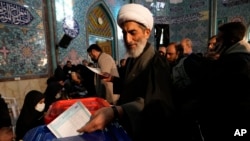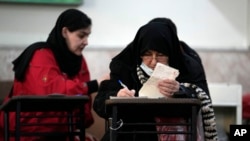Iranian Parliament and Assembly of Experts elections began Friday amid warnings and promises from officials of the Islamic Republic urging Iranians to vote.
"Casting a ballot, a simple act, yields substantial results, thus this opportunity must be seized," Supreme Leader Ali Khamenei said Wednesday.
Conversely, a chorus of voices including political, civil and organizational figures inside and outside of Iran recently called for an election boycott. They said Iran's situation, notably over the past three decades, has shown little to no substantial change post-elections.
Nevertheless, reports indicate that leading up to Friday, the authorities of the Islamic Republic employed various tactics aimed at increasing voter turnout. They are granting four days of leave to soldiers, permitting voting with five different identity documents, and implementing security measures against individuals advocating for a boycott.
Prisoners were told voting was mandatory and those "who abstain from voting should be prepared to face the consequences," Karamullah Azizi, the head of Karaj's Ghezel Hesar Prison told inmates, according to the Human Rights Organization Hengaw.
Hengaw also said education departments in Kurdish cities warned teachers through phone calls that "voting is compulsory, even if it's against the regime. Failure to comply will lead to expulsion." The warning came as the Coordination Council of Iranian Teachers' Associations, Iran's largest independent professional organization, described Friday's elections as "theatrical."
The calls for citizens to vote coincided with a February 20 report from Etemad Online, an Urdu language news outlet, that said recent surveys conducted by certain official institutions and organizations suggest that "in the latest survey by the Islamic Republic of Iran Broadcasting [IRIB], definite participation nationwide is estimated at 35 percent."
The Iranian Students' Polling Agency also released the results of its third survey conducted among more than 5,100 individuals on February 26 and 27.
It said 38.5% intended to participate in the elections, 7.6% said they were likely to participate, 16% remained undecided, 32.6% said they would abstain from voting entirely, and 5.4% indicated potential participation.
The director of the Group for Analyzing and Measuring Attitudes in Iran unveiled findings of a survey conducted Wednesday indicating that the estimated turnout for the elections was 25% to 30% nationwide.
Ammar Maleki told VOA on Thursday that projected voter turnout in Tehran has been estimated at a maximum of 11%. Maleki said the survey was conducted over a 24-hour period, drawing from a balanced sample of more than 28,000 respondents from within Iran and literate individuals older than 19 years old.
Matthew Miller, the U.S. State Department spokesperson, told a VOA Persian Service reporter on Thursday that elections in the Islamic Republic of Iran are "neither free nor fair."
"It's worth noting that thousands of candidates have been disqualified in a non-transparent manner previously," said Miller. "And it's widely recognized that Iran's political framework lacks democratic and transparent elements in its executive, judicial and electoral systems."





